 |
 |
 |
| |
Depression and HIV Infection are Associated with Higher Risks of All-Cause Mortality in U.S. Veterans - Depression Adds to Mortality Risk With HIV in Large US Veterans Cohort
|
| |
| |
IDWeek 2016, October 26-30, 2016, New Orleans
from Jules: looking at Baseline Characteristics you can see HCV was more prevalent among HIV+ depressed compared with HIV+ non depressed and more prevalent among depressed HIV+ compared with depressed HIV-negatives.
Mark Mascolini
Depression defined by responses to the PHQ-9 survey added to the all-cause mortality risk seen with HIV in a 2000-person analysis of US veterans with and without HIV [1]. The link between depression and mortality held true even in veterans with a viral load below 500 copies when follow-up began.
Previous work ties depression to greater systemic inflammation and cardiovascular disease in people with HIV, noted Indiana University researchers and collaborators who conducted the veterans study. But prior research yielded mixed results on whether depression contributes to mortality in HIV populations. The researchers hypothesized that "both depression and HIV infection predict all-cause mortality."
To test that hypothesis, the investigators analyzed data from both the Veterans Aging Cohort Study (VACS) and from a subset of VACS participants in the VACS Tissue Repository Cohort. In the VACS they defined baseline major depressive disorder by ICD-9 diagnostic code; in the Tissue Repository Cohort they defined baseline depression as a Patient Health Questionnaire (PHQ)-9 score of 10 or more.
Study participants had to be free of cardiovascular disease at baseline and HIV-negative participants could not become positive during the study period. Median follow-up measured 8.0 years in the VACS group and 6.1 years in the Tissue Repository Cohort. The researchers used Veterans Health Administration data to determine who died during follow-up. To assess the impact of baseline depression and HIV status on risk of all-cause mortality, they used Cox proportional hazards models controlling for baseline demographics, body mass index, traditional cardiovascular risk factors, substance use, HCV infection, reduced renal function, hemoglobin, alcohol abuse, schizophrenia, bipolar disease, and post-traumatic stress disorder. They used the same type of model in veterans with a baseline viral load below 500 copies.
The VACS analysis involved 29,529 HIV-positive and 64,770 HIV-negative veterans without depression and 5857 positive and 11,674 negative veterans with depression. The Tissue Repository Cohort included 1021 HIV-positive and 422 negative veterans without depression and 296 positive and 190 negative veterans with depression. Age averaged around 49 in the VACS and around 51 in the Tissue Repository Cohort, and large majorities in all groups were men.
During follow-up, 14.4% in the overall VACS and 12.5% in the VACS under-500-copy subset died. In the overall Tissue Repository Cohort 13.5% died, as did 10.7% in the under-500-copy subset of the Tissue Repository Cohort.
In the adjusted VACS analysis, compared with nondepressed HIV-negative veterans, nondepressed HIV-positive vets and depressed HIV-positive vets both had a 70% higher risk of all-cause mortality. In other words, depression did not add to the HIV-related death risk, as indicated by the following adjusted hazard ratios (aHR) and 95% confidence intervals (CI):
Compared with no depression/HIV-negative:
No depression/HIV+ aHR 1.7, 95% CI 1.6 to 1.7, P < 0.001
Depression/HIV+ aHR 1.7, 95% CI 1.5 to 1.8, P < 0.001
Among HIV-positive veterans with a baseline viral load below 500 copies, those without depression had a 40% higher risk of death and those with depression had a 50% higher risk:
Compared with no depression/HIV-negative:
No depression/HIV+ aHR 1.4, 95% CI 1.4 to 1.5, P < 0.001
Depression/HIV+ aHR 1.5, 95% CI 1.3 to 1.6, P < 0.001
In the overall Tissue Repository Cohort analysis, the associations between HIV and all-cause mortality were larger and were greater with than without depression:
Compared with no depression/HIV-negative:
No depression/HIV+ aHR 1.8, 95% CI 1.2 to 2.7, P < 0.01
Depression/HIV+ aHR 2.2, 95% CI 1.4 to 3.4, P < 0.01
Theses associations held true in Tissue Repository Cohort members with a baseline viral load below 500 copies (though marginally for the HIV-positive group without depression):
Compared with no depression/HIV-negative:
No depression/HIV+ aHR 1.5, 95% CI 0.9 to 2.3, P = 0.07
Depression/HIV+ aHR 1.8, 95% CI 1.0 to 3.1, P = 0.04
The researchers concluded that HIV had a bigger impact than depression on all-cause mortality in the overall VACS groups, but in the Tissue Repository Cohort, "depression appeared to have an additive role to HIV infection in predicting all-cause mortality, even in those with HIV viral load less than 500 copies/mL at baseline." That between-cohort difference suggested to the investigators that the PHQ-9 survey (used in the Tissue Repository Cohort) is a more sensitive gauge of depression than diagnostic ICD-9 codes when assessing death risk with depression. They cautioned that the findings primarily involved male veterans and may not apply to other HIV populations.
Reference
1. Gupta S, So-Armah K, Stewart J, et al. Depression and HIV infection are associated with higher risks of all-cause mortality in U.S. veterans: A Cohort Study. IDWeek 2016, October 26-30, 2016, New Orleans. Abstract 2179.
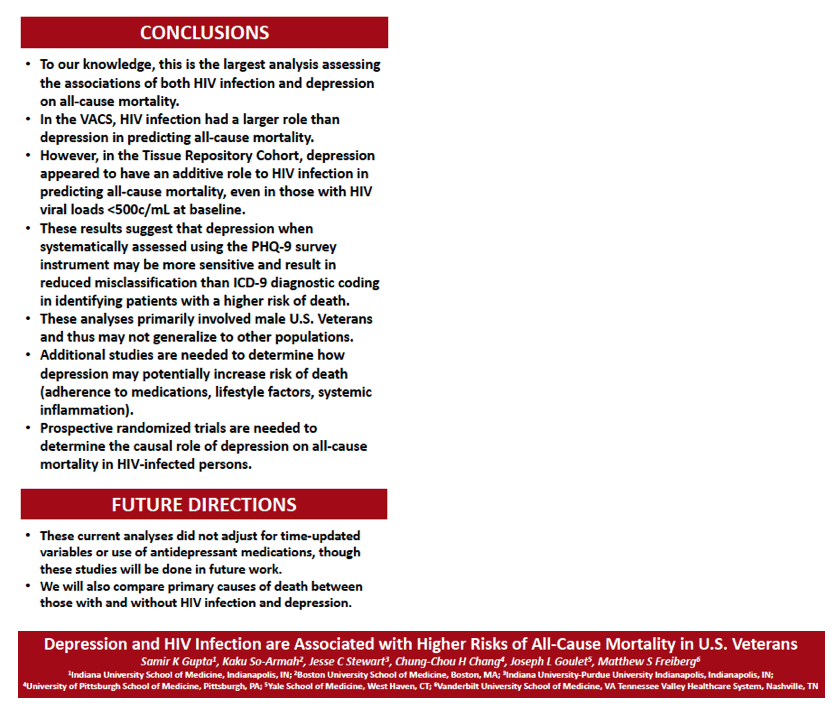
Depression and HIV Infection are Associated with Higher Risks of All-Cause Mortality in U.S. Veterans
Samir K Gupta1, Kaku So-Armah2, Jesse C Stewart3, Chung-Chou H Chang4, Joseph L Goulet5, Matthew S Freiberg6
1Indiana University School of Medicine, Indianapolis, IN; 2Boston University School of Medicine, Boston, MA; 3Indiana University-Purdue University Indianapolis, Indianapolis, IN;
4University of Pittsburgh School of Medicine, Pittsburgh, PA; 5Yale School of Medicine, West Haven, CT; 6Vanderbilt University School of Medicine, VA Tennessee Valley Healthcare System, Nashville, TN
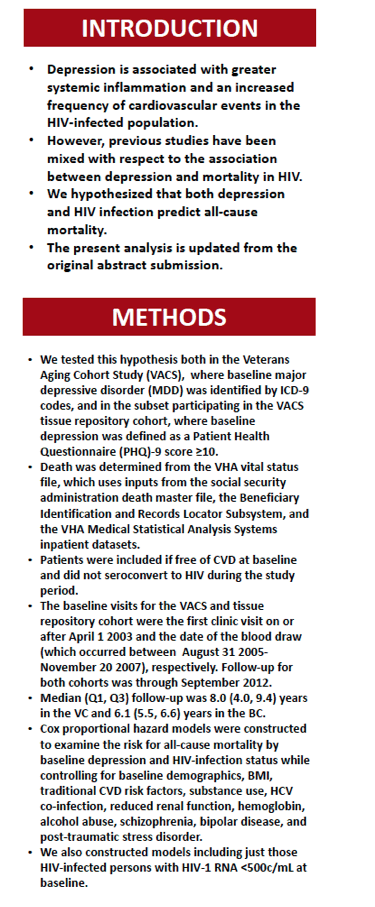
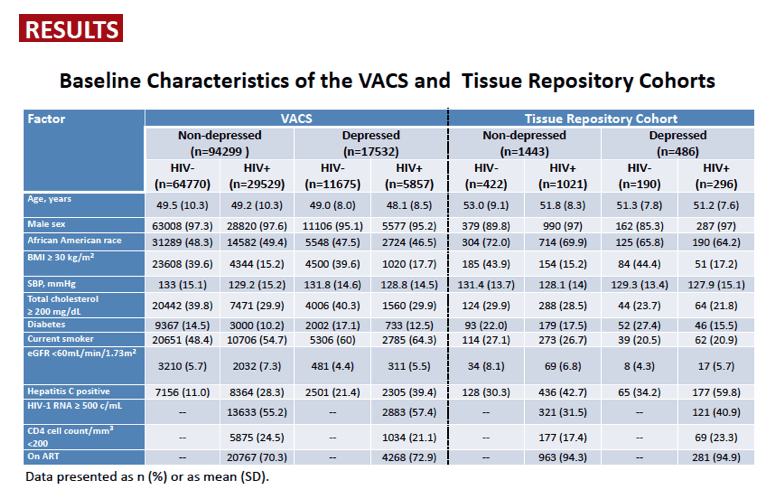

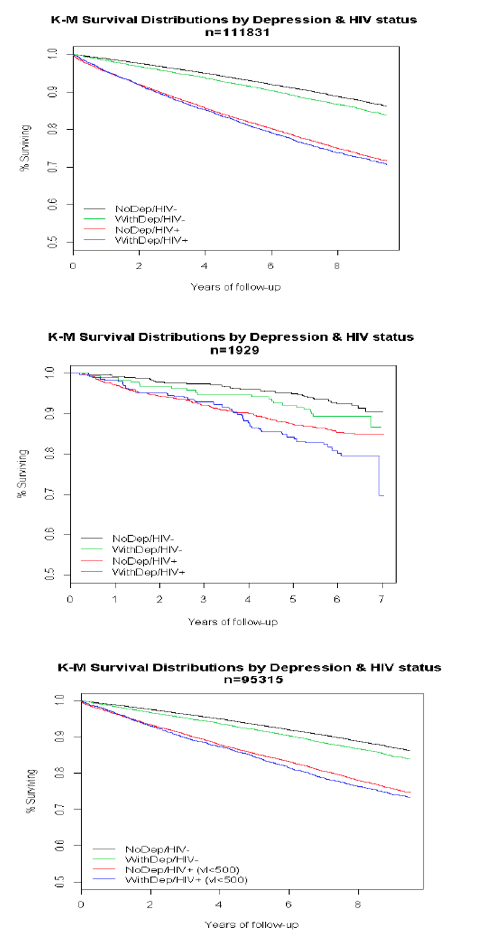
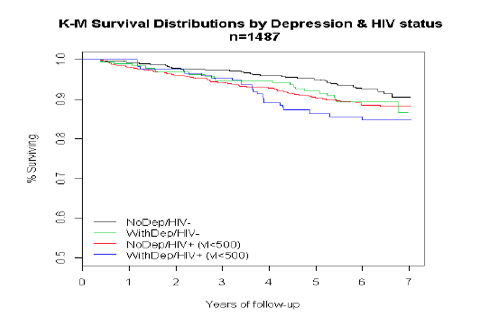
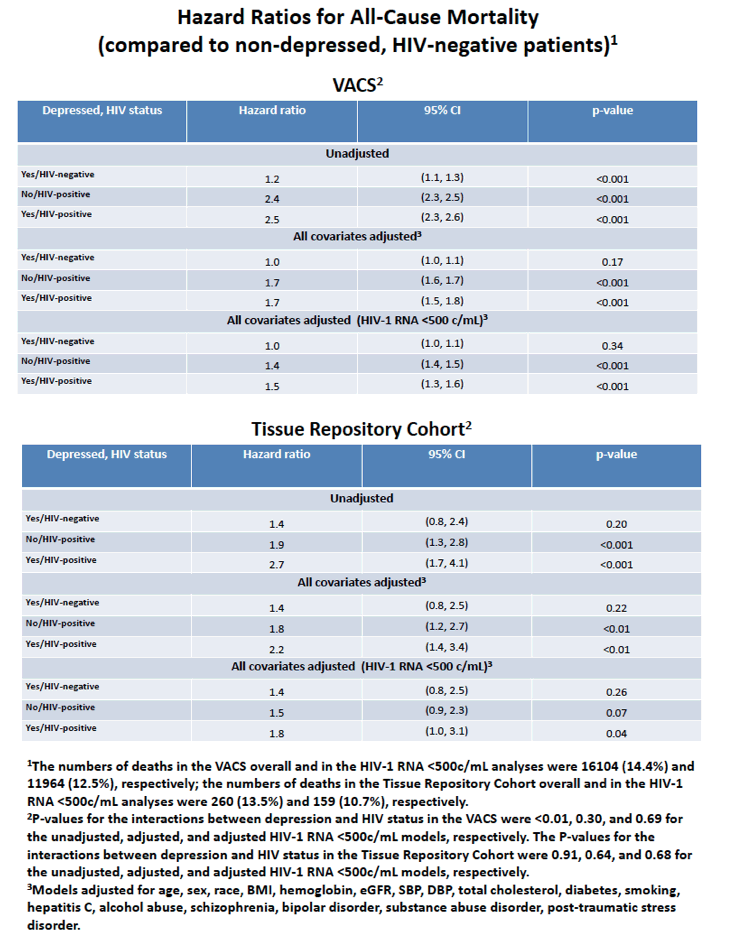
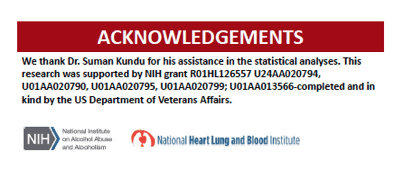
|
| |
|
 |
 |
|
|